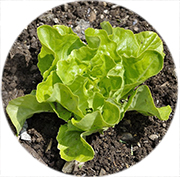Mary Hinman Abel in 1893 reminisced about the salads her family ate from their garden. If you have a garden, you’ll understand how tempting it is to just nibble on one picked salad green from the garden for your complete salad. It’s a bit bland, yet fresh. Later in the season, lettuces get bitter. I would say most people bring them to the mulch pile and if it’s early enough in the season, plant more–but that’s not always the case. The younger people in the Hinman family sprinkled bitter leaves with sugar and vinegar, and the grandpa spiced it with cut fat pork as the rest of the family observe with a touch of horror. The food of one generation is not the food of another, particularly at the family table. Can you remember an example of this at your table?
Here’s the 1893 article by Mary Hinman Abel.
The Habit of Salad Eating
“Imitate our foreign neighbors as we will, we do not need to be the “oldest inhabitants” to remember quite other ways of feeding than now prevail. It is not so long ago that lettuce, plain, was our only salad.
“Those of us of Yankee descent, brought up in the country, remember well the lettuce bed. It was sown early, broadcast, and “thinned out” for table use.
“The head varieties with their bleached and tender centers were unknown to us. Our lettuce was bitter rather oftener than not. But in the absence of all those early vegetables that are now furnished us from the southern truck farms, it was welcome, when it appeared on the table still dripping from its bath and eaten—tell it not in Gaul*—with vinegar and sugar.
“Only a plentiful sprinkling ot sugar could atone for the sour and the bitter to the youthful palate. The grind of the sugar, the bite of the acid, we remember it yet.

“The grandfather disdained the sugar and cut fat pork in bits to mingle with his lettuce—a practice considered by the family as quite too barbarous for imitation: but the dish was a good one, as anyone may prove, and mixed on the right principle of using an oil to milden the raw vegetable.
“Since then we have imitated foreign foods both on the ground and at home, until we have really come as a people to like many things once new to us; still, only the other day, in a half rural city, a fashionable lady was heard to say: “Put cream and not oil in the salad if there are to be many people at the party who are past middle age.” The taste for olive oil has been ”acquired” by those who have it.” — Mary Hinman Abel, 1893, May 14, the Salt Lake Herald.
*”Tell it not in Gaul,” essentially means don’t tell your enemies, originally from “Tell it not in Gath,” 2 Samuel 1:20. [biblehub]


